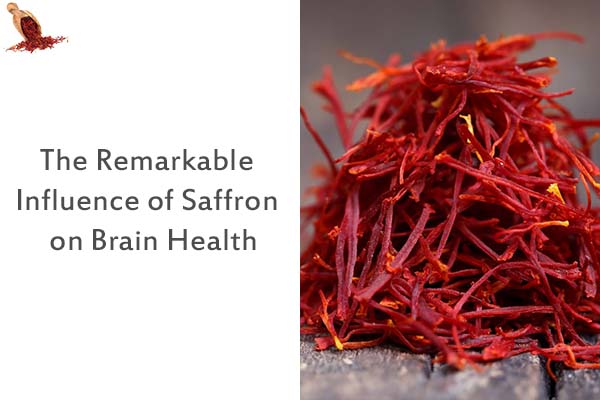The Remarkable Influence of Saffron on Brain Health

Heralded as “red gold,” Saffron transcends its culinary prestige, unveiling profound health benefits, notably enhancing brain function. This expanded overview delves into the nuances of saffron’s impact on neurotransmitter production, underpinned by scientific research, to offer a comprehensive insight into its neuroprotective and cognitive-enhancing potentials.
It is recommended that you visit the page related to the saffron price
Neuroprotective Properties of Saffron
Saffron’s neuroprotective capabilities are particularly beneficial against neurodegenerative conditions such as Alzheimer’s and Parkinson’s diseases. These ailments, predominant in older people, manifest through symptoms from cognitive decline to personality changes. The complexity of these diseases necessitates multifaceted therapeutic approaches. Studies from the Journal of Pharmacology show Saffron, rich in compounds like crocin, crocetin, and safranal, provides a broad spectrum of pharmacological effects, including antioxidant, anti-inflammatory, and antidepressant properties. Its efficacy in mitigating symptoms of depression, anxiety, and cognitive impairments in Alzheimer’s disease has been substantiated through both preclinical and clinical evaluations.
Saffron, celebrated for centuries for its culinary value and medicinal properties, is particularly intriguing in cognitive health. This comprehensive overview draws upon various scientific studies to explore saffron’s impact on neurotransmitter production, offering insights into its potential benefits for brain health. With its unique crocin, crocetin, and safranal blend, Saffron displays various pharmacological properties, such as antioxidant, anti-inflammatory, and antidepressant effects. Studies both in animals and humans have shown that Saffron has the potential to reduce symptoms associated with depression, anxiety, and cognitive impairments in Alzheimer’s disease. Studies from the National Institutes of Health – National Library of Medicine confirm the properties of saffron.
Saffron’s influence extends beyond neuroprotection, significantly affecting cognitive and mental health. It is noted for its capacity to relieve nerve pain, combat insomnia, and enhance concentration and learning abilities. This is attributed to its analgesic and anesthetic components, further reinforcing its utility in strengthening nervous system functions. Furthermore, its antioxidative and anti-inflammatory attributes enhance its efficacy in managing conditions such as depression and Alzheimer’s, improving memory and learning capabilities.
Empirical Evidence Supporting Saffron’s Benefits
The relationship between saffron and brain neurotransmitters, such as dopamine and glutamate, underscores its potential positive impact on mental health. It suggests therapeutic benefits for various brain disorders and enhancement of mental well-being enhancement.
The intriguing relationship between saffron and the brain’s neurotransmitter systems, particularly dopamine and glutamate, provides significant insights into its therapeutic potential for mental health. Dopamine, a neurotransmitter associated with pleasure, reward, and motivation, and glutamate, critical for learning and memory, are vital for optimal brain function. Saffron’s effect on these neurotransmitters can improve mood, cognitive function, and overall mental well-being. Studies suggest that saffron increases dopamine and glutamate levels in the brain, potentially by inhibiting their reuptake or modulating the activity of receptors involved in their signalling pathways. This modulation helps alleviate symptoms of depression, enhance learning, and increase motivation, making saffron a promising natural remedy for treating and managing mental health conditions.
Further empirical evidence supports the benefits of saffron on dopamine and glutamate production, highlighting its role in neuroprotection and neurotransmission enhancement. For instance, research has shown that saffron and its active components, such as crocin and safranal, can protect neurons, promote brain cell growth, and improve neurotransmitter function. These mechanisms contribute to saffron’s antidepressant, anti-anxiety, and cognitive-enhancing effects. By influencing the levels and activity of dopamine and glutamate, saffron offers a multifaceted approach to boosting mental health, suggesting its utility as a complementary treatment for disorders characterised by neurotransmitter imbalance. The ongoing exploration of saffron’s impact on neurotransmitters underscores the need for further research to fully understand its mechanisms and optimise its therapeutic potential.
Consumption Guidelines and Safety Measures
While saffron offers numerous health benefits, adhering to recommended dosages to prevent potential side effects is crucial. Individuals with certain health conditions or those who are pregnant should consult with healthcare professionals before incorporating saffron into their diet.
When considering saffron for its health benefits, it’s essential to follow consumption guidelines and heed safety measures to mitigate potential side effects. Recommended dosages should not be exceeded to avoid adverse reactions. Furthermore, individuals with pre-existing health conditions, as well as pregnant women, are advised to consult healthcare professionals before incorporating saffron into their dietary regimen. This precaution ensures that saffron consumption is safe and beneficial, aligning with individual health needs and circumstances.
Enhancing Cognitive Function and Mental Well-being
Beyond its neuroprotective effects, saffron plays a pivotal role in cognitive and mental health. It has been shown to alleviate nerve pain, counteract insomnia, and bolster concentration and learning abilities. The presence of compounds with analgesic and anesthetic properties within saffron underscores its utility in enhancing nervous system functions. The spice’s antioxidative and anti-inflammatory attributes further contribute to its effectiveness in managing depression and Alzheimer’s disease, improving memory and learning outcomes.
Empirical Support and Scientific Validation
The positive impact of saffron on brain neurotransmitters such as dopamine and glutamate, crucial for mood regulation and cognitive functions, is well-documented. This relationship underscores saffron’s potential to positively influence brain health, offering therapeutic benefits for various brain disorders and enhancing overall mental well-being.
Dosage Considerations and Safety
While the benefits of saffron are manifold, adherence to appropriate dosages is crucial to avoid potential side effects. Overconsumption may lead to adverse reactions, including dizziness and vomiting, necessitating caution and, in some cases, medical consultation, especially for individuals with specific health conditions or those pregnant.
Ensuring the Quality of Saffron
In light of saffron’s susceptibility to impurity, authentic, high-quality saffron cannot be overstated. Parsa Global Saffron and Tea emerged as a beacon of trustworthiness, offering saffron that is not only of superior quality but also certified by prestigious standards such as ISO 22000, ISO 9001, ISO 3632-1, ISO 3103, and HACCP from the UK. These certifications affirm the commitment to excellence and safety, ensuring consumers receive the best product.
Embrace the Saffron Advantage with Parsa Global Saffron and Tea
The extensive body of research affirms saffron’s significant role in promoting brain health, from neuroprotection to cognitive enhancement and mental health improvement. As health-beneficial nutraceuticals like saffron demand surges, discerning consumers should prioritise quality and authenticity. With its certifications, Parsa Global Saffron and Tea guarantees the highest quality saffron, empowering consumers to harness its health benefits confidently.
Enhance your diet with the inclusion of saffron and witness the transformative effects on your brain health and overall well-being. Trust in Parsa Global Saffron and Tea to provide you with the finest saffron, a step towards a healthier, more vibrant life.

 Herbal Tea Bags
Herbal Tea Bags Premium Dried Fruit
Premium Dried Fruit